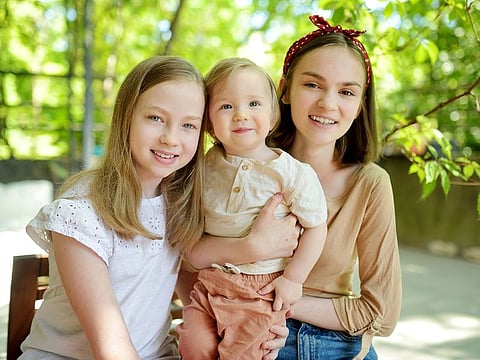Big age gap between kids? This is how to help them get along
Siblings can be great friends – with a little help from their parents

There’s a nine-year age difference between Priyanka Khare’s kids; one is 16, the other seven. And the bubble-gum effect; sometimes close, other times stifling; of sibling generation gaps is definitely playing on her mind. “It’s very mixed kind of behaviour from him [the elder son], and at times, he’s super bossy – more than a mother could be,” Khare explains in an interview with Gulf News.
Seven years ago, when the parents noticed their first-born feeling lonely, being the only one in his social circle without a sibling, they decided to grow their family. The result has been “interesting”. “Now that the elder one is in boarding school, my major challenge comes from the fact that he [the younger one] feels all alone here,” she says.
Also Read: Should you have a third child?
His absence in the house is conspicuous because when COVID-19 was at its zenith, both brothers were stuck together – at home. Complicated dynamics aside, in these past two years, the brothers found their way around each other. “After two years here, he has gone back and that’s been a blow to the younger one,” she explains. “He went from being very happy to being aggressively sad. For him it’s two different tangents of emotions.”
Of course it’s not always smooth sailing when you look at siblings who belong to different generations; sometimes the advice (read intervention) of a parent can help bonds along. So here are some tips from experts on how to help the kiddos – young and old – become better friends.
1. Don’t dismiss the difference: “Acknowledge in your own minds the big age gap and that their interests will be different. This will help you as parents to manage your expectations,” says Ross Addison, Managing Director and Child and Adolescent Cognitive Behavioural Therapy Specialist at UAE-based Reverse Psychology.
“On occasion a large age gap can work very well, as the elder child assumes more responsibility. When the age gap is less than five years, it's fair to expect some challenges in their relationship. The gap isn't quite big enough for the elder child to take on a phantom parenting role, and typical challenges arise when the elder finds the younger child/children annoying. The younger siblings will be jealous of the elder, who has more freedom, mobile device and additional allowance, and this can create some resentment.”
2. Quality time is key: Addison recommends not expecting (read forcing) the older kid to spend all their free time with their sibling. “Instead, focus on quality time, often as a family,” he says.
Nardeen Turjman, Clinical Psychologist at the UAE-based German Neuroscience Centre, adds: “It is important for members of the family to spend quality time together as a whole, as well as spend one-on-one time. Building and developing positive relationships between family members can lead to a strong family connection as the children will feel valued, loved and cared for.”
3. Be the bridge: By gauging if they share interests or introducing them to something new. “Try to see if they have things in common,” he says.
4. Role model considerations: “Consider sitting with the elder child and discussing how they are seen as a role model, and that the younger child wants to be just like them and have access to the freedom that they have,” says Addison.
“The older child should be encouraged to assist the younger, as they can be seen as a role model. This will allow the older child to be part of the younger child’s developmental milestones, while increasing their self-esteem and confidence,” adds Turjman.
5. Parent-child time: This one-on-one time with a kid is imperative not just for the siblings’ relationship with one another, but also with you. “Do an activity of their choice,” suggests Addison.
6. Set house rules: This will help each individual understand the values their parents are instilling in them, says Addison.
7. Word it better: “The eldest may resent being told that he's the 'eldest and should know better'. Consider rewording this sentiment to something like, 'You have more life experience than (child), he/she is still learning how to manage....’
8. Be there for the big days: Priyanka Dang, Clinical Psychologist at Openminds Centre, Dubai, says, “Don’t miss the older one’s important days like annual concerts and sports days.”
9. Bonding time: The best way to help the kids bond may be for the parent to take himself/herself out of the equation. “Create opportunities for special time together and if possible (and safe), let the kids be together without the parent’s presence,” says Dang. Except when it comes to praising a positive meeting. “Praise positive interactions between the kids (irrespective of whoever might have initiated it),” she adds.
Turjman adds: “Forming a strong bond between the children helps them get along, nix any resentment. This can be done through several different ways, such as raising awareness of the developmental level difference as it will develop patience and understanding, while providing a safe environment to talk, specifically with the older child if they feel frustrated.”
10. Avoid ‘parentification’ of the older sibling: Just because there is a big age gap between the kids, it does not mean that the older kid can consistently take on adult responsibilities towards the younger one. It is also not advisable for the younger child to be conditioned into expecting the older sibling to fulfil needs that should actually be met by the parents, she says.
“Finally, it is important to remember that parenting children, whether with big age gaps or not, is not supposed to be a perfect act. We are allowed to have less than perfect days as parents. Acknowledge your shortcomings and trust yourself,” says Dang. Be patient. The kids will get along.
Have a topic you'd like discussed? Write to us at parenting@gulfnews.com



